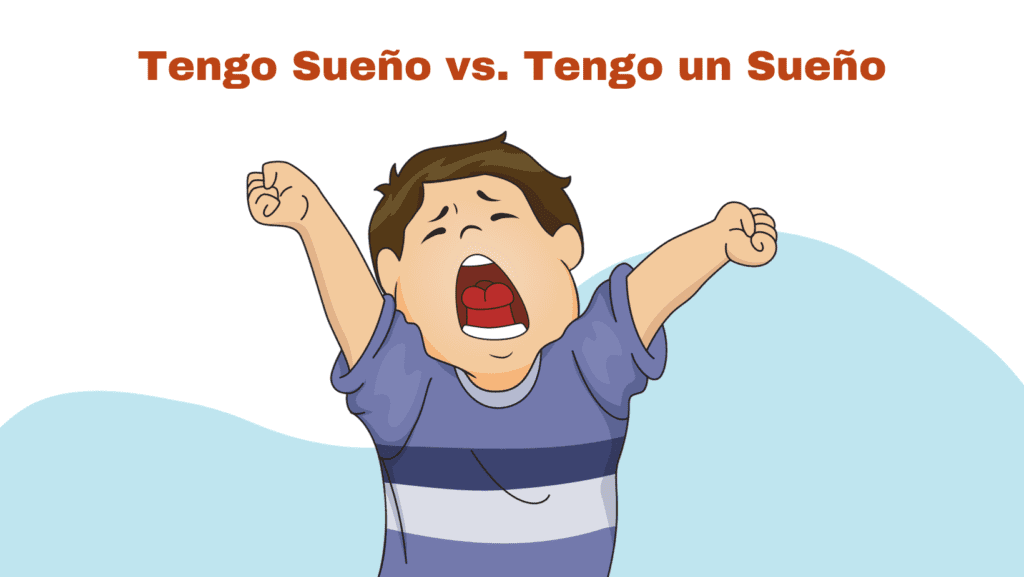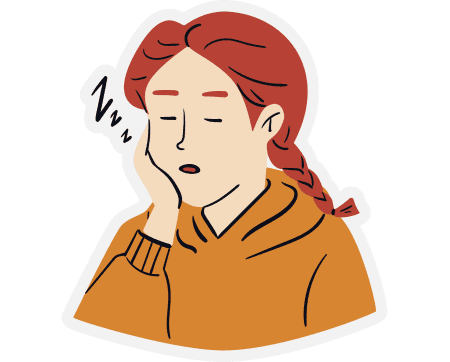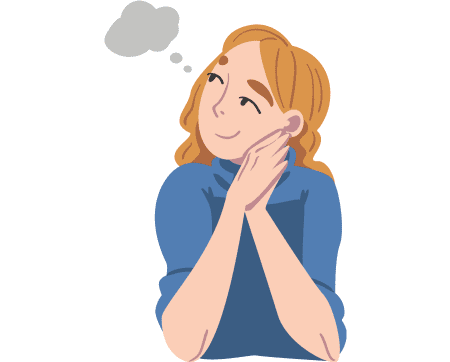
Dreaming of Siestas?
¿Tengo sueño or Tengo un sueño? Do you feel sleepy? Do you have a dream? Or just dreaming while sleeping? Or even better, day dreaming of sleeping with that person that makes your inner middle reverberate?
¡Y al fin! ¡No comprendo, hombre! ¿”Tener sueño” o “tener un sueño”? ¿Cuál es la diferencia? Here you go: Learn the difference with Kasa De Franko – A Fun Spanish School!
Decoding siestas and dreams in Spanish can feel like a Sisyphean task. We know! And that’s why we are here to help! Let’s get started with some possible real-life scenarios.

Let´s Get Into the Sleepy Mood First!
Have you ever found yourself in a Spanish-speaking situation, feeling the need for either a nap or perhaps just dreaming big?
Understanding the difference between “tengo sueño” and “tengo un sueño” is key to avoiding hilarious or slightly awkward situations. Let’s delve into the confusing world of these Spanish expressions.

Tengo Sueño
Midday Slump: After a massive lunch, with the sun shining, you feel the irresistible urge to catch some Zs. Exclaim, “¡Tengo sueño!” to signal it’s siesta time or maybe just time for a coffee to fight drowsiness.
All-Nighter Regret: Having binged your favorite Spanish TV series until 3 AM, you roll into work bleary-eyed and declare, “Tengo sueño.” Your colleagues nod knowingly – it’s the universal language of the sleep-deprived.
Very tired (muy cansado): It was a very difficult day at work and you are tired from working more than ten hours. You get home and hug Michi (your son-cat) and tell him: ¨¡Tengo sueño! ¡Vamos a dormir!¨ (I’m sleepy! Let’s go to sleep!).
You see: These are the most common scenarios where you can say ¨tengo sueño.¨ Of course, there are many more but, for now, you just got the gist of it. It means, I am sleepy! Right?

Tengo un Sueño
MLK: In the grand tradition of Martin Luther King Jr., if you have a vision for a better future, proclaim, “Tengo un sueño.” This is not about dozing off; it’s about having a dream that could change the world – the language of aspirations, hope, and making a difference.
Getting Romantic: Picture a romantic proposal confessing your love, you passionately declare, “Tengo un sueño, contigo” Here, you’re not saying you’re sleepy or telling your sweetheart: you are boring me!
Or much less, I wanna sleep or have sex with you! You’re actually saying you have a dream of a beautiful life together. Cue the romantic music.

Balancing Dreams and Dozes
When Multitasking Emotions you can feel both sleepy and dreamy simultaneously? Say, “Tengo sueño y tengo un sueño.” It’s like multitasking with your emotions – acknowledging the need for a nap while still holding onto your dreams.
That could be too much! Better take a nap and dream about your future dreams so you can keep day-dreaming while working on those dreams.

The Nuances
Watch out: you can also say “tengo un sueño” and you are not per se talking about your dreams. How do we know? It may be midnight and it is pass your bedtime and you definitely look sleepy and while yawning you’re telling us: “tengo un sueño (de lo más fuerte)”. In English, I am feeling very sleepy. Of course, the phrase in parenthesis is omitted.
In summary: Remember the fine line between dreams and dozes navigating the Spanish language landscape. ¡Buena suerte y buen descanso! (Good luck and good rest!)

The Need for an Indefinite Article?
In this case, you are adding the indefinite article “un” for emphasis. If you want to put more emphasis, you can say: “tengo un sueño de mierda” (I am fucking sleepy). The use of article “un” for emphasis is similar to the use in the phrase: “Él es un buen profesor”. We can omit the indefinite article and the phrase would still make sense. However, the intensity of the message is different.
Find out in our next article for Kasa De Franko’s Blog, which one is correct: “Franko es profesor” o “Franko es un profesor”.

Wanna read more?
For more interesting language mishaps, check our KDF Blog category called Language Bloopers. Don´t miss out when Mike Cocke told his girlfriend he liked her mom’s vagina: “Me gusta la chucha de tu madre”. You need to learn this common mistake when learning Spanish!

Interested in Spanish Pillow Talk?
Visit our KDF sexy series: Things Spanish People Say in the Bedroom to check out the hot phrases you can tell your loved one in Spanish—or in a pre-Hispanic language if you get to read the article on the Giant Erotic Ceramics in Peru.

Enjoy Spanish Folktales?
Check out our KDF folktales section to know the story of El Sexi Chupacabaras and learn Spanish with la Llorona, la Ciguapa, la Santa Muerte and many other characters from the Spanish tradition.

Spanish Free Programs at Kasa De Franko
We began this article inspired by a historic and impactful statement such as “Tengo un sueño” (“I have a dream”). This phrase echoes Martin Luther King Jr.’s iconic speech during the March on Washington in 1963.
As we celebrate the greatness of the United States, shaped by leaders like Martin Luther King Jr., Kasa de Franko, a San Jose and San Francisco Bay Area Language School, is committed to translating the ideals of unity and understanding into tangible experiences through language education.
In tribute to MLK’s fight for equality, KDF is delighted to offer you complimentary lessons to kickstart your journey towards a more diverse society.
And always remember: To fulfill your dream of becoming fluent in Spanish…

